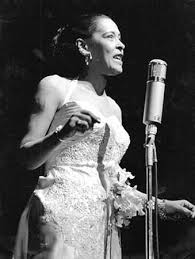Now's the Time: Three Women of Jazz Today
by Con Chapman
In some respects, the world of jazz resembles the Elizabethan stage. There are the bare, unadorned sets on which the two art forms are displayed; there is the fact that in both cases, little of what is performed is reduced to writing; and there are no, or hardly any women.

Billie Holiday
There are, of course, female jazz vocalists, from Bessie Smith, to Billie Holiday, to Sarah Vaughan, to Ella Fitzgerald, to Nina Simone, and so on. But if you had to name five female jazz instumentalists of note, you'd be hard pressed.

Mary Lou Williams
There's Lil Hardin, Louis Armstrong's piano player; there's Mary Lou Williams, a pianist of the swing era; there's pianist Toshiko Akiyoshi, who with her husband, Lew Tabackin, kept a big band going for three decades. And with that, as the lawyers say, I've exhausted my present memory.
.jpg)
Toshiko Akiyoshi
Why this should be so is unclear, but it is probably not the result of some nefarious plot to keep women out of a notoriously low-paying and insecure profession. In jazz, as in many other walks of life, there is no women's division; America's greatest native art form has no WNBA equivalent.
Jo Jones
Jazz is a strict meritocracy that accepts only those who make the cut, both artistically and in terms of their personal dedication to a highly unremunerative profession; in the old days, when there were neighborhood jazz clubs in every city of even moderate pretensions to urbanity, a young musician made his way up the ladder through emulation, participating in after hours ”cutting” sessions.

Charlie Parker
There were, however, no mulligans on this course. Jo Jones, Count Basie's drummer, sent a cymbal crashing down towards Charlie Parker late one night when the latter horned in (I know, I'm sorry) on a Kansas City jam session not quite ready for the big-time. Parker went off to lick his wounds, and eventually made his way to the top of the profession.

Sonny Rollins
Or one can advance as the protegee of an elder statesman, but even then the guild maintains its standards. In the '70′s Sonny Rollins appeared at the Jazz Workshop in Boston with a young tenor player whom he'd taken under his wing. When the time came for the apprentice to take his solo, he crapped out; Rollins dropped him, and he's never been heard from again.

Terri Lyne Carrington
Which makes it doubly, or perhaps triply satisfying, that there are alive and working today three young women of accomplishment in the world of jazz, all playing rhythm instruments and leading their own groups, available for you to hear live or on recordings.

Fats Waller: “Your feets too big!”
At 45, Terri Lyne Carrington is the eldest of the three, a musical prodigy who began playing at the age of 7 when her father, who had played with Fats Waller and Chu Berry, among others, gave her a drum set. She received a full scholarship to Boston's Berklee College of Music at age 11, and her professional coming-out party was a date with trumpeter Clark Terry at the Wichita Jazz Festival when she was only 17. She's worked with Donald Harrison and Greg Osby, among others, and has a new CD out—More to Say.

Esperanza Spalding
Bassist Esperanza Spalding, like Carrington, has ties to Boston's Berklee School of Music; she also received a full scholarship there, but Spalding had a tougher time, as she lived in Oregon while Carrington grew up in the Boston area. Discouraged and broke, she almost gave up on music, but was encouraged to stick it out by Berklee alum Pat Metheny, who told her she had “the X factor”. She took his advice, and after just one semester was asked to accompany Patti Austin on an international tour—”For Ella”—a tribute to Ella Fitzgerald.

Linda Oh
Lastly, Linda Oh, a twenty-five-year-old Chinese-Malaysian bassist whose debut recording “Entry”, with trumpeter Ambrose Akinmusire and drummer Obed Calvaire, was recently released. “Entry” is a concept album, not a collection of unrelated songs, and Oh's music tends towards the blissful, a far cry from the hard stuff—Led Zeppelin and the Red Hot Chili Peppers—that first inspired her to take up the bass.
Perhaps there is progress in the world after all.
|
0
favs |
877 views
3 comments |
755 words
All rights reserved. |
Author's Note
The author has not attached a note to this story.
Other stories by Con Chapman
Tags
This story has no tags.
Diana Krall, Ingrid Jenson, Joni Mitchell...
But yes, true, and I will have a listen to the new bassists, thanks!
Don't know Ingrid Jenson, will check her out.
Diana Krall reminds me of Julie London, a singer of the 50's known for her version of Cry Me a River. Jazz--yes--but a trifle soporific.
Well, there's Alice Coltrane, of course. And Norm Klein, late of Chicago, introduced me to a young Chicago percussionist, Noritaka Tanaka.